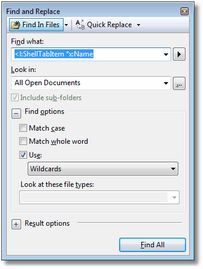Purpose
|
New
|
Example
|
Match any single character (except a line break)
|
.
|
a.o matches "aro" in "around" and "abo" in "about" but not "acro" in "across".
|
Match zero or more occurrences of the preceding expression (match as many characters as possible)
|
*
|
a*r matches "r" in "rack", "ar" in "ark", and "aar" in "aardvark"
|
Match any character zero or more times (Wildcard *)
|
.*
|
c.*e matches “cke” in “racket”, “comme” in “comment”, and “code” in “code”
|
Match one or more occurrences of the preceding expression (match as many characters as possible)
|
+
|
e.+e matches "eede" in "feeder" but not "ee".
|
Match any character one or more times (Wildcard ?)
|
.+
|
e.+e matches "eede" in "feeder" but not "ee".
|
Match zero or more occurrences of the preceding expression (match as few characters as possible)
|
*?
|
e.*?e matches "ee" in "feeder" but not "eede".
|
Match one or more occurrences of the preceding expression (match as few characters as possible)
|
+?
|
e.+?e matches "ente" and "erprise" in "enterprise", but not the whole word "enterprise".
|
Anchor the match string to the beginning of a line or string
|
^
|
^car matches the word "car" only when it appears at the beginning of a line.
|
Anchor the match string to the end of a line
|
\r?$
|
End\r?$ matches "end" only when it appears at the end of a line. <objectUI\r?$ founds all <objectUI followed by new line.
|
Match any single character in a set
|
[abc]
|
b[abc] matches "ba", "bb", and "bc".
|
Match any character in a range of characters
|
[a-f]
|
be[n-t] matches "bet" in "between", "ben" in "beneath", and "bes" in "beside", but not "below".
|
Capture and implicitly number the expression contained within parenthesis
|
()
|
([a-z])X\1 matches "aXa"and "bXb", but not "aXb". ". “\1” refers to the first expression group “[a-z]”.
|
Invalidate a match
|
(?!abc)
|
real (?!ity) matches "real" in "realty" and "really" but not in "reality." It also finds the second "real" (but not the first "real") in "realityreal".
|
Match any character that is not in a given set of characters
|
[^abc]
|
be[^n-t] matches "bef" in "before", "beh" in "behind", and "bel" in "below", but not "beneath".
|
Match either the expression before or the one after the symbol.
|
|
|
(sponge|mud) bath matches "sponge bath" and "mud bath."
|
Escape the character following the backslash
|
\
|
\^ matches the character ^.
|
Specify the number of occurrences of the preceding character or group
|
{x}, where x is the number of occurrences
|
x(ab){2}x matches "xababx", and x(ab){2,3}x matches "xababx" and "xabababx" but not "xababababx".
|
Match text in a Unicode character class, where “X” is the Unicode number. For more information about Unicode character classes, see
Unicode Standard 5.2 Character Properties.
|
\p{X}
|
\p{Lu} matches "T" and "D" in "Thomas Doe".
|
Match a word boundary
|
\b (Outside a character class \b specifies a word boundary, and inside a character class specifies a backspace).
|
\bin matches "in" in "inside" but not "pinto".
|
Match a line break (ie a carriage return followed by a new line).
|
\r?\n
|
End\r?\nBegin matches "End" and "Begin" only when "End" is the last string in a line and "Begin" is the first string in the next line.
|
Match any alphanumeric character
|
\w
|
a\wd matches "add" and "a1d" but not "a d".
|
Match any whitespace character.
|
(?([^\r\n])\s)
|
Public\sInterface matches the phrase "Public Interface".
|
Match any numeric character
|
\d
|
\d matches and "3" in "3456", "2" in 23", and "1" in "1".
|
Match a Unicode character
|
\uXXXX where XXXX specifies the Unicode character value.
|
\u0065 matches the character "e".
|
Match an identifier
|
\b(_\w+|[\w-[0-9_]]\w*)\b
|
Matches "type1" but not &type1" or "#define".
|
Match a string inside quotes
|
((\".+?\")|('.+?'))
|
Matches any string inside single or double quotes.
|
Match a hexadecimal number
|
\b0[xX]([0-9a-fA-F])\b
|
Matches "0xc67f" but not "0xc67fc67f".
|
Match integers and decimals
|
\b[0-9]*\.*[0-9]+\b
|
Matches "1.333".
|

